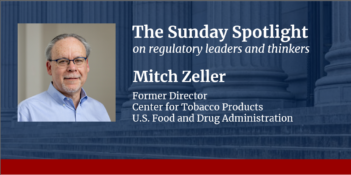
Scholar argues that overruling deference to agencies will constrain U.S. government action.
The Republican Party once championed the power of bureaucracy, but now, the party criticizes administrative agencies and seeks to repeal a landmark decision it once applauded, one legal expert argues.
In a new article, Craig Green, professor at Temple University Beasley School of Law, seeks to explain this observed shift. He argues that conservatives changed positions suddenly around 2013, when they began to argue for overruling a longstanding legal doctrine calling for courts to defer to agency bureaucrats. According to Green, conservatives’ new argument threatens to make agencies, the U.S. Congress, and the President less democratically accountable and less capable of responding to changing needs.
Green explains that conservatives’ target is Chevron deference—a doctrine established by the U.S. Supreme Court in the 1984 case Chevron v. Natural Resources Defense Council. The doctrine directs courts to defer to an agency’s interpretation of ambiguous law, as long as the interpretation is reasonable.
Green identifies a complete reversal in conservatives’ position on Chevron deference today as compared to 50 years ago.
Green observes that in the 1980s, President Ronald Reagan wanted to relax environmental restrictions but could not achieve his goals through Congress, so he decided to deregulate from within the executive branch by using his appointed bureaucrats. Accordingly, President Reagan adopted a litigation policy of encouraging judicial deference to agency decisions, Green notes.
These efforts, according to Green, culminated in the landmark Chevron decision. The decision required courts to yield to reasonable agency interpretations of statutes, which gave Presidents wide discretion to fill statutory gaps and craft policy outside of Congress.
Green argues that Republicans viewed the Chevron decision as a success for the Reagan Administration, and conservatives chastised critics of bureaucracy after the decision. According to Green, some conservative voices even hinted that deference to agencies was constitutionally required.
Today, on the other hand, Green contends that mainstream conservatism stands against Chevron deference, with the most recent Republican Party platforms condemning regulatory agencies and calling for judicial action to stop them.
Green argues that this shift against Chevron deference is striking because conservatives have not acknowledged their previous support for the doctrine and have justified both positions by using the same philosophy: constitutional originalism, a legal view that focuses on the intent of the U.S. Constitution’s framers. But to Green, conservatives’ new argument is not focused on the framers’ views. Instead, he argues that their position stems from partisan politics under the convenient guise of a timeless legal philosophy.
By examining conservative think tank publications, legislative proposals, judicial decisions, and Republican presidential platforms from the 1980s to the present, Green asserts that conservatives nearly universally accepted Chevron as constitutional until President Barack Obama’s reelection in 2012. At that point, for the first time, conservatives criticized Chevron deference as unconstitutional and began to advocate constitutional litigation as a way to end it, Green argues.
Green finds some developments in the shift curious. For example, he observes that Supreme Court Justice Anthony Kennedy had ample opportunity to raise constitutional questions about Chevron deference during his 43 years on the federal bench before he first condemned it in a concurring opinion in Pereira v. Sessions in 2018.
Green also points out that Justice Clarence Thomas, despite applying deference as recently as 2013 by joining an opinion from Justice Antonin Scalia, began to argue that Chevron deference was unconstitutional in a series of decisions in 2015.
Some scholars have argued that opinions on deference change in tandem with party politics. The party in the White House will favor deference to its own administration, while the opposing party will attack it.
But Green pushes back by claiming that the historical record does not support that narrative. He finds that mainstream conservatives supported agency deference through multiple Democratic administrations, and they later opposed deference despite the election of President Donald J. Trump.
So why the sudden change in 2013? And why did conservatives maintain their opposition to Chevron even under the Trump Administration?
Green contends that a strongly conservative federal court system could be lending Republicans confidence that closer, less deferential review of agency decisions will lead to favorable outcomes.
Republican Presidents nominated 13 of the 17 most recent Supreme Court appointees and over half of sitting federal appellate judges. The Trump Administration also ensured that its judicial appointees held anti-agency viewpoints, according to Green.
By contrast, when the Supreme Court decided Chevron, nearly two-thirds of appellate judges were Democratic appointees.
Green argues that unlike Justice Scalia’s generation, which hoped to protect presidential policymaking from liberal judges, contemporary conservatives have recognized that they can exert political power in the judiciary by using this appellate court advantage and by invoking flexible constitutional principles.
Green also suggests that the new originalist opposition to Chevron could be related to a partisan focus on the “deconstruction of the administrative state,” as former White House Chief Strategist Steve Bannon reportedly described. Green argues that President Trump implemented a deregulatory agenda using the regulators themselves.
Green notes that the Trump Administration employed hostile language toward agencies and undermined them through funding cuts and furloughs. Green argues that the Administration appointed agency heads hostile to their departments and worked to undercut trust in independent experts.
Green also warns that “not all precedents are created equal” and that readers should take seriously the Supreme Court’s potential to overrule Chevron apart from political changes in the executive branch. He contends that, if the Court does overturn Chevron, it could result in the invalidation of hundreds of prior decisions applying deference.
Green also claims that undermining deference through the courts could shift power away from Presidents, who would no longer be able to execute policy through agencies. As a result, the “dead hand” of prior administrations would restrain Presidents, and dynamic policymaking would be more difficult. Green also argues that overruling deference would constrain Congress from creating agencies to handle new, unforeseen problems.
Green suggests that overruling Chevron could ultimately result in more conservative law being made. He argues that conservative judges might selectively review agency decisions and grant deference to agency interpretations that align with conservative policy goals while scrutinizing interpretations that clash with conservative agendas.
According to Green, partisan politics should not dictate the future of Chevron deference, but they must not be ignored in understanding the history and constitutionality of the doctrine. Green argues that both liberals and conservatives must acknowledge the deeper issues at play in the debate over Chevron’s future. Only by recognizing the full consequences of overruling Chevron can the Court avoid creating a disaster, he concludes.



